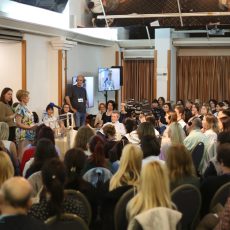Richard G. Erskine, PhD held education: Obsession, habitual worrying and repetitive fantasizing: a perspective from relational and integrative psychotherapy on March 24th, 25th and 26th 2023, at 6pm to 9pm (GMT/UTC + 1h).
Outpatient psychiatric practice “Bubera” hosted this event with technical support of National Association for Transactional Analysis of Serbia – NATAS and Association “Belcounsel”.
This is the fourth consecutive year in which we have the honor to organize a education-training held by Dr. Richard G. Erskine, a world-renowned lecturer and psychotherapist who masterfully explains theoretical and demonstrates practical psychotherapeutic concepts.
We invited all professionals in the field of mental health, psychotherapists and trainees of various psychotherapeutic approaches to apply for this program, and especially trainees of Transactional analysis, Integrative Psychotherapy, Gestalt therapy, Body psychotherapy and Psychoanalysis.
Obsession, habitual worrying and repetitive fantasizing, either independently manifested or concomitant with shame, absorb much of our client’s mental activity thereby interfering with their spontaneity, intimacy, and living joyfully in the present. The psychotherapy of obsessions is complex because of the compounded and continually reinforcing multiple intrapsychic functions. A respectful and patient inquiry into the client’s phenomenological experience is required to learn the unique combination of intrapsychic functions.
Obsessions, recurring fantasies, rigid behavioral patterns, and habitualized feelings are all maintained by an individual because they provide significant psychological functions. In an effective psychotherapy, the functions of the repetitive behavior, feeling, or fantasy must first be identified and appreciated by the client prior to any lasting growth or even change. It is essential in an in-depth treatment of obsession to assess the origins and intrapsychic functions of the repetitive fantasizing and to validate how those multiple functions help the client to maintain psychological homeostasis.
Because, in the life of a young child, these psychological functions were originally relational in nature. As a result of relationship failure and the disruption of interpersonal contact, the functions became internalized, defensive, and attached to something intrapsychic, such as obsessive thoughts or feelings, the urge for compulsive behavior, or repetitive fantasy.
Through a relational therapy and phenomenological inquiry the therapist facilitates the client in gaining an awareness of relational needs, appreciating the intrapsychic functions of an obsession, transferring those functions to the therapeutic relationship, and engaging significant others in interpersonal contact.
We explored the origin of repetitive fantasizing, habitual worrying and obsessions:
- the psychological functions, (as for example: predictability, identity, continuity, compensation, reparation, efficacy, integrity, stability and triumph);
- script beliefs;
- The processes of avoidance;
- archaic experience;
- relational-needs; and
- self-responsibility.
Dr Erskine presented a six-point therapeutic plan for the psychotherapy of clients who engage in obsession, habitual worrying and repetitive fantasizing.
The six-point therapy plan focuses on how obsession is often an attempt to disavow affect and engage in intellectualization rather than feel emotions.
We discussed how methods of: cognitive understanding, behavioural change, affective expression and relational psychotherapy could be applied in therapy planning – with a view to reclaiming of our client’s sensitivities to others and their personal sense of contentment.
Participants were encouraged to present their work with clients (in the way that respects confidentiality of the client) for case discussion (supervision) from Dr Erskine, because this workshop was envisioned as a way to apply theory directly in psychotherapeutic practice with clients.
If you didn’t participate in the workshop, and want to watch the recording (or recordings of any of the workshops organized or co-organized by outpatient practice Bubera or NATAS) you can order recording by clicking HERE (link will take you to web site of NATAS, co-organizer of this event). Our recommendation is to participate in person whenever it is possible, because that way you can communicate with a lecturer directly.
This education was in English and Serbian language with consecutive nonprofessional translation done by colleagues from mental health field. (You can read here about consecutive interpreting: what is consecutive interpreting).
Erskine, PhD, insists on consecutive translation, because this is the best way to attune alive with translators and participants – to monitor whether participants understand the content, to monitor participants and their reactions and potentially include them in the discussion.
This seminar was accredited as the I category professional meeting under registration number A-1-259/23 by the Medical Chamber of Serbia, and only participants who had taken part in seminar got certificate with two CME points, and nine hours of education.
Who was eligible for this education?
Psychiatrists, clinical psychologists, clinical social workers were eligible to participate in the seminar, but also all other professionals (special pedagogues, andragogues, MDs, nurses…) provided that they were in the process of psychotherapy training, and that they had filled in application form.
Handouts, PowerPoint presentation and video recording of the education are not included in the price.
For more information contact:
Zvonko (Zvonimir Ninić); Email: natasrbije@gmail.com
Phone/Text/Viber/WhatsApp +38163249239
Richard G. Erskine, PhD is a Clinical Psychologist and Training Director of the Institute for Integrative Psychotherapy.
Originally trained in client-centered child therapy, Dr Erskine also studied Gestalt therapy with both Fritz and Laura Perls.
He is a certified clinical Transactional Analyst and a Licensed Psychoanalyst who has specialized in psychoanalytic self-psychology and object-relations theory.
His work is an integration of these concepts and fifty years of clinical experience which has included working with disturbed children, inmates in a maximum security prison, borderline and narcissistic clients, post-traumatic stress and dissociative identity disorders.
Recently his research and clinical practice have focused on the treatment of the schizoid process and on the psychotherapy of obsession.
He is the author of several books and scores of articles on psychotherapy theory and methods. His best-selling book (with Jan Moursund and Rebecca Trautmann) is “Beyond Empathy: A Therapy of Contact-in-Relationship” (1999, Brunner/Mazel). Recently he published The Art and Science of Relationship: The Practice of Integrative Psychotherapy 2022, Early Affect Confusion: Relational Psychotherapy for the Borderline Client 2021, A Healing Relationship: Commentary on Therapeutic Dialogues 2020, and now prepares the book about the Schizoid process
Photo by Nik Shuliahin on Unsplash




Is there an option to buy this course as a recording? I am unable to attend.